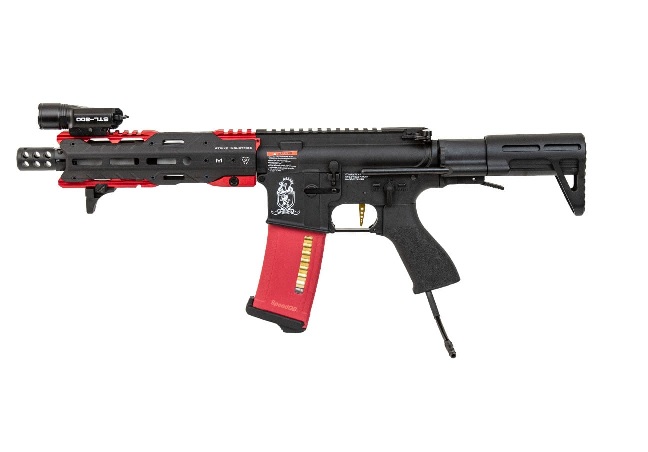You might have come across some replica toy guns that shoot non-metallic spherical plastic pellets. At first glance, you may have sworn those replica toy guns, known as airsoft guns, were real. With so much resemblance to a real gun, you may wonder whether the use of airsoft guns is legal in Nigeria. Keep on reading to find that out.

-
Is Airsoft Legal in Nigeria?
Yes, an Airsoft gun is legal in Nigeria as a self-defense weapon. Therefore, using Airsoft to ward off an assault on your person is legal in Nigeria. However, it is not legal to use Airsoft for criminal activities or to commit a felony. The penalty for the usage of Airsoft for criminal activities and the intention to commit a crime is 3 years imprisonment if the offender is found guilty by a competent court of law. The provisions of the Criminal Code, Firearm Act, Robbery and Firearms (Special Provisions), and Public Order Act are the enacted laws that we base our stance on.
-
What is the Legality of Airsoft in Nigeria?
Airsoft guns are classified as offensive weapons under the Robbery and Firearm (Special Provision) Art. Offensive weapons, according to the aforementioned enactment, are made or adapted for use for causing injury to someone else or intended for such use.
Airsoft guns, as offensive weapons, do not need a Police clearance license to own. It is therefore legal in Nigeria.
Although airsoft guns are legal to own, using them to assault an individual is a crime. Assault here means striking, touching, moving, or otherwise applying force in such a degree as to cause injury or personal discomfort to the person of another, either directly or indirectly, without their consent. To this end, using airsoft guns to commit a crime or with the intention to commit a crime is a punishable offense liable to 3 years imprisonment according to several enactments such as the Robbery and Firearm (Special Provisions) Act.
Airsoft guns, however, can be used in such a way that it isn’t a crime. One such way where the usage of airsoft guns is permitted in Nigeria is when they are used as a self-defense tool. That is, using airsoft guns to ward off a potential assailant is self-defense and not assault, so not a crime. Another situation in which airsoft guns could be used without being classified as an assault is if they are used as props for filmmaking.
The following federal laws were consulted to come up with our stance above:
- Criminal Code Act 1916
- Public Order Act 1979
- Robbery and Firearms (Special Provisions) Act 1984
- Firearm Act 1959
-
What are Airsoft Guns and How Do They Work?
Airsoft guns are a type of low-power air guns. They are usually designed to resemble an actual firearm, however, instead of bullets, the projectile that is shot from airsoft guns are non-metallic plastic pellets. Another distinguishing feature of airsoft guns from actual guns is that airsoft guns usually have orange (could be another colour) muzzle tips.
Generally, the power plants of airsoft guns are designed to have low muzzle energy ratings which are typically less than 1.5g or 1.1ft. lb. More so, the pellets of airsoft guns are significantly less penetrative than conventional airguns.
The design mechanism that propels the projectiles (i.e. pellets) of airsoft guns is categorized into two groups: mechanical pellet propulsion mechanism and pneumatic pellet propulsion mechanism. Airguns that are designed with the mechanical pellet propulsion mechanism consist of a coil spring-loaded piston air pump that is either manually cocked or automatically cycled by a battery-powered motor gearbox.
Airsoft guns that use the pneumatic pellet propulsion mechanism are operated by the valve-controlled release of prefilled bottled gas. The gas is usually compressed propane mixed with silicone oil, or sometimes CO2 canisters.
When an airsoft gun is shot, the velocity of the discharged pellets ranges from 30m/s (for a low-end spring pistol airgun) to 200m/s (for heavily upgraded customized sniper airsoft rifles). When the internal components of airsoft guns are upgraded, their pellet velocity increases significantly.
Airsoft guns that shoot heavier pellets (.25g, .3g, etc) usually have a reduced muzzle velocity but may increase accuracy at range. Heavier pellets are also less susceptible to wind drift. Lighter pellets, on the other hand, have less kinetic energy and high exit velocity. However, lighter pellets do not have an increased range.
-
What are the Uses of Airsoft Guns?
There are various ways airsoft guns are used. In the military, airsoft guns are used as a reliable and affordable training tool for close-quarter battles. The gas blowback airsoft gun is the type of airsoft used for military training as they allow for correct weapon manipulation drills, muscle memory training, stress inoculation, and force-on-force simulations.
Airsoft guns are also used as props on stage plays and screens thanks to their realistic resemblance to actual guns. Furthermore, airsoft guns are used in airsoft sports, such as skirmishes. Although airsoft sports are quite unpopular in Nigeria, they are a big deal in several other countries. A typical airsoft game involves different players armed with airsoft weaponry in a simulation of combat situations shooting at each other. Players usually put on protective gear to reduce the impact of the projectile.
Conclusively, airsoft guns can also be used as a self-defense tool. If you plan on owning an airsoft gun as a self-defense weapon, put in mind the type of pellets your airsoft gun has. Heavier pellets have increased accuracy at range and reduced susceptibility to wind drift but low velocity. Lighter pellets, on the other hand, have higher exit velocity but with lesser accuracy at range. Heavier pellets are therefore the preferred projectile for your airsoft gun if you intend to use it as a self-defense weapon.
We should warn that airsoft guns shouldn’t be carried about as they could easily be perceived as actual guns. Remember, in Nigeria, firearms are not permitted to be handled by civilians in public.